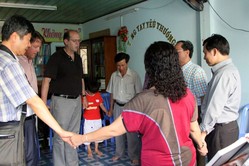Ho Chi Minh — a city many still know as Saigon — is a place of bustling activity in southern Vietnam, with motorcycles flooding every intersection like so many bees swarming a hive.
But the church in Vietnam is buzzing as well. It’s not in grand or beautiful cathedrals that one will see this activity of the Spirit at work, but dispersed across the city and the region in a network of house churches tucked away in small neighborhoods and out-of-the-way places.
This network of house churches — some 120 compared with only 9 formal church buildings — has grown into the 7,500 members of the United Presbyterian Church of Vietnam (UPCV). Its largest church has more than 200 members; the smallest, close to 20. There are 24 ordained pastors, 33 evangelists and 16 elders.
Because Vietnam is historically and traditionally a Buddhist country — and currently a Communist country — many are surprised to find that the Christian church is beginning to take root here.
Through the efforts of French Catholic missionaries in the 19th and early 20th centuries, roughly 8 percent of Vietnam’s population of 87 million consider themselves Catholic.
Protestant mission activity came to Vietnam a century ago, beginning with the Christian Missionary Alliance in 1911. Protestants in Vietnam make up about 1.2 percent of the total population.
The UPCV, a Presbyterian Church (U.S.A.) partner church, has its roots in a revival that began in 1988. Pastor Ho Tan Khoa, a third-generation Christian and a leader of the UPCV, has helped to birth this growing church.
“In 1988 we called for a time of prayer — seven days of fasting and praying — and the Holy Spirit began to open doors,” Khoa said in a recent meeting in Ho Chi Minh City with representatives from the PC(USA).
Thus, the house church movement was born. But this growth was not without consequences. Seen by the communist government as a threat to control, the house church movement became a threat to the established and government-sanctioned official Protestant church and was excommunicated.
“So, we went back to our homes and started our own church,” Khoa said. “By the grace of God, we were able to meet an American-Korean pastor, Pastor Lee, who helped train us and taught the Bible for a time.”
But when Lee left, the seven newly trained pastors, including Khoa, were left to lead the growing church on their own.
Though many different denominations approached this group and invited them to join their denomination, the group chose to become Presbyterian in large part due to the theology and polity of the Presbyterian Church.
Needing resources for training leaders and studying scripture, the group sought help from Presbyterians in the United States. The Rev. Binh Nguyen, of Washington’s Mercer Island Presbyterian Church, heard about the need. In 2002 he sent a number of Presbyterians to Vietnam to answer that call. They were able to train 14 pastors — nine of whom are still serving the UPCV.
Though government persecution has lessened in the past five years, it is still a real issue for the UPCV, limiting the size of gatherings, dictating that events such as weddings and ordinations be held in hotel ballrooms so as not to arouse suspicion, and creating a need for caution when bringing in outside visitors to some of the more remote countryside churches.
But this does not stop the UPCV, which continues to seek ways to plant new churches and to reach out to indigenous tribal groups as well as university students studying in cities away from home.
“But even though we have persecution, we must carry out the work,” said Khoa, citing 1 Corinthians 15:58. “What the people in Corinth have done is helpful for us — for we also have been doing what God has called us to do in this nation and we know that our labor is not in vain.”
For the United Presbyterian Church in Vietnam the harvest has been one that has faced many trials but that has begun to bear much fruit.
Erin Dunigan is a freelance writer, photographer, and pastor who lives in a small coastal community in Baja California, Mexico when she is not following her wanderlust out into the world.

